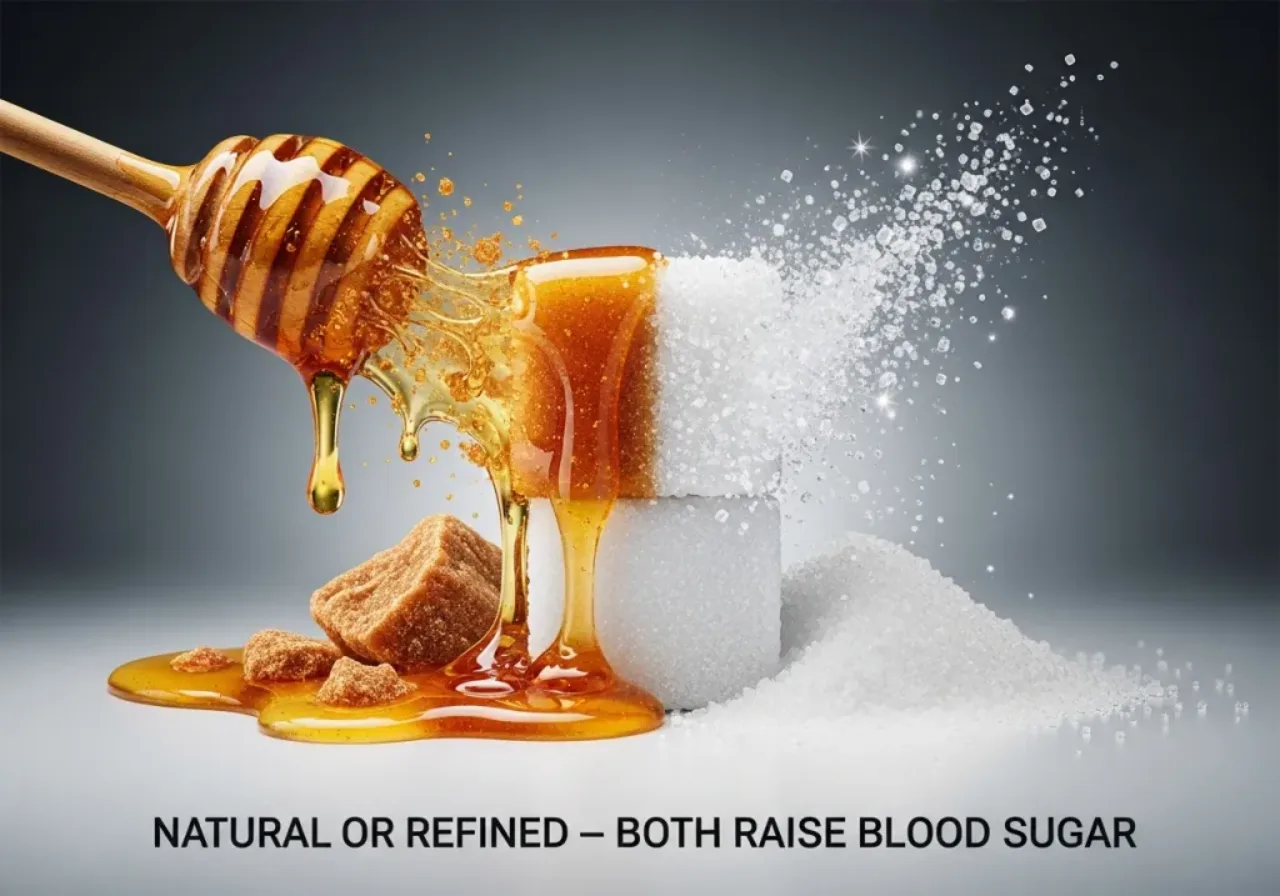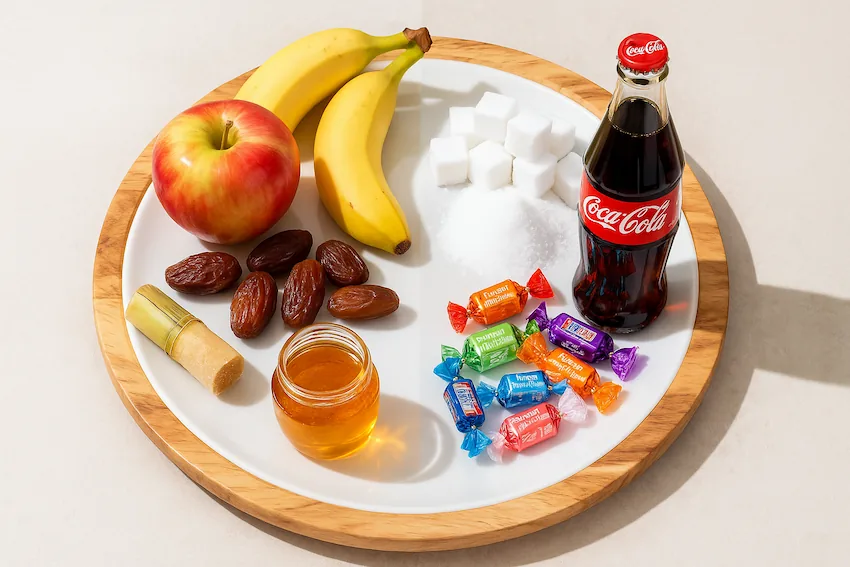Introduction: Why This Debate Matters
At Redial Clinic, one of the most common questions patients ask is:
“Doctor, if I stop white sugar and switch to honey or jaggery, will my diabetes improve?”
Others ask, “Is natural sugar better than artificial? What about brown sugar or raw sugar?”
The confusion is real. Food companies aggressively market jaggery, honey, and “raw” sugar as healthier choices. Meanwhile, refined sugars are demonized. But the truth is: your body doesn’t care about marketing—it only cares about sugar and insulin response.
To get clarity, we must break down the types of sugar and understand the natural vs artificial sugar debate.
What Is Natural Sugar?
Natural sugar refers to sugars that occur naturally in whole foods. While they seem safer, not all natural sugars behave the same way inside your body.
Sources of Natural Sugar
- Fruits – contain fructose and glucose. Mangoes, bananas, grapes, and dates are very high in natural sugar.
- Milk and dairy – lactose is the natural sugar in milk.
- Honey – a mix of fructose and glucose, often marketed as a superfood.
- Jaggery & coconut sugar – essentially sucrose with minor traces of minerals.
Here’s the key: your body treats glucose from jaggery exactly the same as glucose from refined sugar. Eating an apple gives you fructose plus fiber and vitamins. Drinking apple juice gives you sugar minus fiber—functionally, it becomes added sugar.
Nutrient Profile & Glycemic Index of Natural Sugars
Some argue natural sugars are better because they contain trace nutrients. For example, jaggery has iron, honey has antioxidants, fruits have vitamin C and fiber. But the amounts are too tiny to meet your nutritional needs.
What matters more is the glycemic index (GI), which shows how fast sugar spikes blood glucose:
- Apple: GI 38 (low, due to fiber)
- Mango: GI 55 (moderate)
- Honey: GI 58 (similar to sugar)
- Jaggery: GI 84 (almost identical to refined sugar)
- Milk: GI 46 (moderate)
So while whole fruits are safer, honey and jaggery spike blood sugar nearly as much as white sugar.
Is “Natural” Always Healthy?
Not necessarily. Arsenic is natural. Tobacco is natural. That doesn’t make them safe.
At Redial Clinic, we often meet patients who say: “Doctor, I don’t eat sugar, I only use jaggery.” Yet their HbA1c remains high. Why? Because their body doesn’t care about labels. It only cares about sugar and insulin response.
This proves that asking is natural sugar better than artificial sugar is misleading. The natural vs artificial sugar comparison shows that both can harm your health if consumed excessively.
What Is Artificial (Refined) Sugar?
Artificial, or refined sugar, refers to industrially processed sugars made from sugarcane, sugar beet, or corn. These are stripped of nutrients and deliver pure calories.
Types of Refined Sugar
- White sugar (table sugar)
- Brown sugar (slightly less refined, but nutritionally the same)
- High-fructose corn syrup (HFCS)
- Processed syrups and glucose-fructose blends
- Sugar in packaged foods and desserts
This is the core of the refined sugar vs raw sugar debate, but when we compare natural vs artificial sugar, the difference is often overstated. Raw sugar may look less processed, but nutritionally, both raw and refined sugars raise glucose in the same way.
Health Effects of Refined Sugar
Refined sugar provides empty calories, no nutrients, and causes rapid blood sugar spikes. Long-term intake leads to:
- Obesity and belly fat
- Fatty liver disease
- Insulin resistance and type 2 diabetes
- Increased triglycerides and cholesterol
- Higher risk of heart disease
When we examine natural vs artificial sugar, it becomes clear that neither is truly “safe” if overconsumed. In fact, refined sugar is not just a source of sweetness—it’s one of the main drivers of the global diabetes and obesity epidemic.
Natural vs Artificial Sugar: Key Differences

So, what is the real difference between natural vs artificial sugar?
- Natural sugars (fruits, milk, honey, jaggery): May contain trace nutrients and fiber (in whole foods) but still spike blood glucose.
- Artificial/refined sugars (white sugar, HFCS, syrups): No nutrients, pure calories, very high GI.
The question is natural sugar better than artificial depends on context. Whole fruits in moderation are better than refined sugar. But jaggery vs white sugar? Practically the same.
Blood Sugar & Insulin: How Both Affect Your Body
Both natural and refined sugars trigger sugar and insulin response:
- Natural sugars (without fiber, like honey or jaggery) cause immediate glucose spikes.
- Refined sugars cause the same or worse spikes, with no nutritional benefit.
Over time, both contribute to:
- Fatty liver
- Insulin resistance
- Higher HbA1c in diabetics
This is why natural vs artificial sugar is a crucial distinction. Whole foods with fiber are safer; refined sugars—whether natural or artificial—are harmful.
Myths Around Brown, Raw, and “Healthier” Sugars
Many believe that switching from white sugar to brown sugar, jaggery, or raw sugar solves the problem. But science shows that in the refined sugar vs raw sugar debate, both are nutritionally identical. Your blood sugar sees no difference.
At Redial Clinic, we advise patients that is natural sugar better than artificial is the wrong question. The real question is: “How much sugar can my body tolerate without harm?”
Pros and Cons
- Natural sugar – provides energy, sometimes nutrients, but spikes glucose.
- Refined sugar – no nutrients, pure calories, high GI.
Healthier Alternatives
If you want healthy sugar alternatives, these are safer:
- Stevia (one of the best natural sweeteners for diabetics)
- Monk fruit extract
- Small portions of berries (low GI, high fiber)
These don’t eliminate the craving for sweetness, but they’re far better than honey, jaggery, or refined sugar.
Real-Life Case from Redial Clinic
Mrs. Gupta, a 48-year-old diabetic patient, proudly told us she had quit sugar and now used honey and jaggery. Yet her HbA1c came back at 8.2%.
Once we explained the truth about natural vs artificial sugar and cut out jaggery and honey, replacing them with small portions of berries, her HbA1c dropped to 5.3% in just three months.
This proves that is natural sugar better than artificial is the wrong question. Both can harm blood sugar control if overused.
How Redial Clinic Helps
At Diabetes Reversal Clinic in Green Park, Delhi, we don’t just say “stop sugar.” Instead, we evaluate:
- Your daily sugar intake (both natural and refined)
- Your sugar and insulin response patterns
- Your relationship with sweet cravings
Then we design customized plans as part of our Diabetes Reversal Treatment to retrain taste buds, reduce cravings, and replace harmful sugars with healthy sugar alternatives.
FAQs about Natural vs Artificial Sugar
Q1. Is natural sugar better than artificial?
Not always. Whole fruits are safer due to fiber, but jaggery, honey, and raw sugar behave like refined sugar.
Q2. What’s the difference between natural and artificial sugar?
Natural sugars occur in fruits, milk, and honey; artificial/refined sugars are processed (white sugar, HFCS). Both spike blood glucose.
Q3. What are healthy sugar alternatives?
Stevia, monk fruit, and small amounts of berries.
Final Verdict
The debate on natural vs artificial sugar is not about choosing the lesser evil. Both can harm when consumed regularly.
- Natural sugars (like jaggery and honey) raise blood glucose quickly.
- Refined/artificial sugars (like white sugar) are pure calories with no nutrients.
- Even artificial sweeteners and diabetes remain controversial due to the side effects of artificial sweeteners.
The safest path is to reduce all forms of sweetness, rely on healthy sugar alternatives, and retrain your palate.
At Redial Clinic, Green Park, we specialize in Diabetes Reversal Treatment that helps patients lower HbA1c and cut dependence on both natural and refined sugars.
Sweetness should be an occasional pleasure—not a daily addiction.
References
| No. | Source | Key Findings |
|---|---|---|
| 1 | American Diabetes Association – Nutrition Consensus Report (2019) | Both natural and refined sugars impact blood glucose. |
| 2 | World Health Organization – Guideline: Sugars Intake for Adults and Children (2015) | Free sugars, whether natural (honey, fruit juices) or refined, should be <10% of daily calories. |
| 3 | Harvard School of Public Health – Sugar & Health | Jaggery, honey, raw sugar, and refined sugar all raise glucose similarly. |
| 4 | NIH – Glycemic Index and Diabetes | Low-GI fruits are safer than jaggery, honey, or refined sugar for diabetics. |
| 5 | ICMR – Diabetes and Nutrition in India Report | Natural sugars like jaggery are not better alternatives for Indian diabetics; focus should be on reducing total sugar load. |






